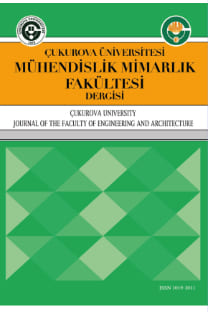Investigation of Velocity Distribution and Turbulent Energy for the Different Tip Shaped Projectiles
Farklı Uç Şeklindeki Mermiler için Hız Dağılımı ve Türbülans Enerjisinin Araştırılması
___
- 1. Noh M.H.M., Rashid H., Hamid A.H.A., Iskandar M.F., 2012. Comparison of Numerical Investigation on Airfoil and Flat Louvers on the Air Duct Intake, Procedia Engineering, 41:1761-1768.
- 2. Arsene S., Sebesan I., Popa G., 2015. The Influence of Wind on the Pantograph Placed on The Railway Vehicles Bodywork, ProcediaSocial and Behavioral Sciences, 186: 1087-1094.
- 3. Driss Z., Mlayeh O., Driss D., Maaloul M., Abid M.S., 2014. Numerical Simulation and Experimental Validation of the Turbulent Flow Around a Small Incurved Savonius Wind Rotor, Energy, 74:506-517.
- 4. Jiang Z., Takayama K., Chen Y., 1995. Dispersion Conditions for Non-Oscillatory Shock Capturing Schemes and Its Applications, Comput. Fluid Dyn., J, 2:137-150.
- 5. Lecysyn N., Dandrieux A., Heymes F., Slangen P., Munier L., Lapebie E., Gallic C.L., Dusserre G., 2008. Preliminary Study of Ballistic Impact on an Industrial Tank: Projectile Velocity Decay, Journal of Loss Prevention in the Process Industries, 21: 627-634.
- 6. Rausch J., Roberts B., 1975. Reaction Control System Aerodynamic Interaction Effects on Space Shuttle Orbiter, Journal of Spacecraft and Rockets, 12:660-666.
- 7. Srivastava B., 1998. Aerodynamic Performance of Supersonic Missile Body-and Wing Tip-Mounted Lateral Jets, Journal of Spacecraft and Rockets, 35: 278-286.
- 8. Ma J., Chen Z-h., Huang Z-g., Gao J-g., Zhao Q., 2016. Investigation on the Flow Control of Micro-Vanes on a Supersonic Spinning Projectile, Defence Technology, 12:227-233.
- 9. Jiang, Z., Huang, Y., Takayama, K., 2004. Shocked Flows Induced by Supersonic Projectiles Moving in Tubes, Computers & fluids, 33:953-966.
- 10. Capata R., 2016. An Artificial Neural Network-Based Diagnostic Methodology for Gas Turbine Path Analysis-Part II: Case Study, Energy, Ecology and Environment 1:351-359.
- 11. Lam, C.K.G., Bremhorst, K.A., 1981. Modified Form of Model for Predicting Wall Turbulence, ASME Journal of Fluids Engineering, 103:456-460.
- ISSN: 1019-1011
- Yayın Aralığı: 4
- Başlangıç: 1986
- Yayıncı: ÇUKUROVA ÜNİVERSİTESİ MÜHENDİSLİK FAKÜLTESİ
The Technical Revisions Required to Prevent Electricity Theft
ÖMER CİHAN KIVANÇ, SALİH BARIŞ ÖZTÜRK
Antakya-Cilvegözü Karayolu Etrafındaki Tarım Arazilerinde ve Bitkilerdeki Ağır Metal Kirliliği
Süs Bitkisi Toprağında Arıtma Çamuru Stabilizasyonu
MESUT BAŞIBÜYÜK, Başak Deniz ERGÜN
MEHMET TÜRKMENOĞLU, NİL YAPICI, Mesut ANIL, ÖZEN KILIÇ
Performance and Economic Analysis of a Variable Refrigerant Flow (VRF) System
ALPER YILDIRIM, ERTAÇ HÜRDOĞAN, COŞKUN ÖZALP
TUBA BAHTLI, Veysel Murat BOSTANCI, DERYA YEŞİM HOPA, ŞERİFE YALÇIN YASTI
Tek ve İki Bina Etrafındaki Rüzgar Etkilerinin Sayısal Olarak İncelenmesi
Mohammad AZARİFAR, S Kazım SÖMEK, FATMA NAZLI DÖNMEZER AKGÜN
